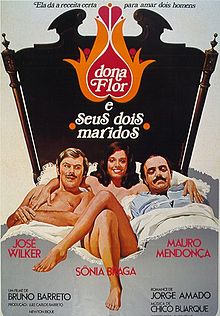- Dona Flor and Her Two Husbands
-
Dona Flor and Her Two Husbands 
Directed by Bruno Barreto Produced by Luiz Carlos Barreto
Newton RiqueWritten by Bruno Barreto
Eduardo Coutinho
Leopoldo Serran
based on the novel by Jorge AmadoStarring Sônia Braga
José Wilker
Mauro Mendonça
Dinorah BrillantiMusic by Chico Buarque de Hollanda
Francis HimeCinematography Murilo Salles Editing by Raimundo Higino Distributed by Embrafilme
Warner Bros. (USA)Release date(s) November 22, 1976 (Brazil) Running time 110 min. Country Brazil Language Portuguese Dona Flor and Her Two Husbands (Dona Flor e Seus Dois Maridos in Portuguese) is a 1976 comedy film directed by Bruno Barreto. Based on the novel of the same name by Jorge Amado, it takes place in 1940s Bahia. It stars Sônia Braga, José Wilker, and Mauro Mendonça in the leading roles. The screenplay was adapted by Barreto, Eduardo Coutinho, and Leopoldo Serran.
When initially released, Dona Flor became the most successful film in Brazilian history. Its box office was only reached by a Brazilian production 35 years later (by the 2010 blockbuster The Elite Squad 2). Internationally, Dona Flor received nominations for a Golden Globe and a BAFTA Award.
In 1982, an American remake titled Kiss Me Goodbye, starring Sally Field, James Caan, and Jeff Bridges on the leading roles, was released.[1] Field received a Golden Globe nomination for Best Actress in a Motion Picture - Comedy or Musical.
Contents
Plot
Vadinho (José Wilker), Flor's irresponsible husband, drops dead while dancing in a street carnival party. Only Flor (Sônia Braga) expresses remorse after his death. Flor's friends and family see Vadinho's death as a chance for Flor to find happiness after the misery brought upon her by Vadinho's spendthrift ways and near total lack of respectability. Roughly the first half of Dona Flor recounts Flor's marriage with Vadinho in an extended flashback. What is made clear is that Vadinho was a great lover who admired his wife's respectability, but enjoyed protracted foreplay until she begged him to continue. He might not paint the house or leave her savings alone, but he changed this inhibited girl into a wife who experienced carnal joy regularly.
The second half of Dona Flor involves Flor's meeting the respectable but extraordinarily dull pharmacist Teodoro (Mauro Mendonça), his courtship of her, and her marriage to him. Flor's friends consider Teodoro the exact opposite of Vadinho. Teodoro belongs in superior circles within Bahia's society, dresses elegantly, and treats Flor like a lady. What Flor's friends do not know is that Teodoro is also the opposite of Vadinho in one more respect: in bed, Teodoro is as lacking as Vadinho was accomplished.
On the anniversary of Vadinho's death, Vadinho reappears to Flor in the nude and explains that she called him to "share her bed" with him. Only Flor can see and hear the nude spirit of Vadinho. She protests because she is now remarried and has pledged to be faithful to Teodoro, but after Vadinho laughs during Teodoro's pathetic attempts at love-making that night, Flor gives in and lives happily with both husbands. A cute shot toward the end of the film shows Teodoro lying in bed next to Flor, who kisses him on the cheek. The camera then pans to the left and we see Vadinho on Flor's other side and she kisses him on the cheek too.
Awards and nominations
BAFTA Film Awards
- Best Leading Newcomer – Sônia Braga (nominated)
Golden Globe Awards
- Best Foreign Language Film (nominated)
- Best Film – Bruno Barreto (nominated)
- Best Director – Bruno Barreto (won)
- Best Film Music – Francis Hime (won)
- Special Jury Award – Anisio Medeiros, production designer (won)
Sources
- Bergan, Ronald and Robyn Karney. The Faber Companion to Foreign Films. Boston: Faber and Faber, 1992.
- Creed-Miles, Jo. "Dona Flor and Her Two Husbands (Dona Flor e Seus Dois Maridos)." TimeOut Film Guide. Ed. John Pym. London: Penguin Books, 2003.
External links
1970s Dona Flor and Her Two Husbands (1976)1980s Gabriela, Cravo e Canela (1983)1990s 2000s Bossa Nova (2000) · View from the Top (2003) · O Casamento de Romeu e Julieta (2005) · Última Parada 174 (2008)Cinema of Brazil  Categories:
Categories:- 1976 films
- Brazilian films
- Films based on novels
- Films directed by Bruno Barreto
- 1970s comedy films
- Portuguese-language films
- Warner Bros. films
Wikimedia Foundation. 2010.
